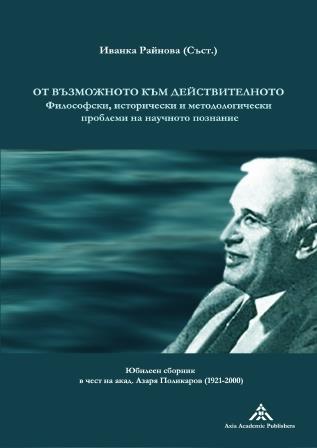Проблематичното отношение „философия – наука“
във феноменологията
The problematic relationship between philosophy and science in phenomenology
Author(s): Yvanka Raynova
Subject(s): Philosophy, Epistemology, Contemporary Philosophy, Philosophy of Science, Phenomenology
Published by: Axia Academic Publishers
Keywords: Brentano; Husserl; Heidegger; Ricoeur; phenomenology; scientificity; philosophical thinking
Summary/Abstract: Since the 19th century, following the rapid rise of the sciences and the changes in the understanding of scientificity, the status of philosophy has been called into question: philosophy has been forced to fight not only for recognition, but even for its right to exist. The denial of philosophy's scientificity and achievements by scientists and technocrats, and hence the destabilization of its place and position within society and academia, led to the "identity crisis" of philosophical knowledge. The different reactions of philosophers in this respect can be reduced, in the final analysis, to two opposing positions: the attempt to justify anew philosophy as a kind of science or the refusal of such a justification. There are also some attempts at intermediate solutions that mainly try to blunt, if not to elimi-nate, the opposition between philosophy and science. This paper offers a fleshing out of this general picture by presenting the various paradigmatic solutions proposed by Brentano, Husserl, Heidegger and Ricoeur. The thesis of Raynova is that the anti-scientism, which is considered to be inherent to the phenomenological schools, does not necessarily imply a negation of the sciences and scientificity. What the phenomenologists deny is scientific reductionism, i.e., the reduction of knowledge to the factual cognition, the naturalization of intentions, or the presentation of thinking as a pure consequence of biochemical processes. Henceforth, phenomenologists take different positions on the question of the relation between philosophy and the sciences and even arrive at opposing views.Since the 19th century, following the rapid rise of the sciences and the changes in the understanding of scientificity, the status of philosophy has been called into question: philosophy has been forced to fight not only for recognition, but even for its right to exist. The denial of philosophy's scientificity and achievements by scientists and technocrats, and hence the destabilization of its place and position within society and academia, led to the "identity crisis" of philosophical knowledge. The different reactions of philosophers in this respect can be reduced, in the final analysis, to two opposing positions: the attempt to justify anew philosophy as a kind of science or the refusal of such a justification. There are also some attempts at intermediate solutions that mainly try to blunt, if not to eliminate, the opposition between philosophy and science. This paper offers a fleshing out of this general picture by presenting the various paradigmatic solutions proposed by Brentano, Husserl, Heidegger and Ricoeur. The thesis of Raynova is that the anti-scientism, which is considered to be inherent to the phenomenological schools, does not necessarily imply a negation of the sciences and scientificity. What the phenomenologists deny is scientific reductionism, i.e., the reduction of knowledge to the factual cognition, the naturalization of intentions, or the presentation of thinking as a pure consequence of biochemical processes. Henceforth, phenomenologists take different positions on the question of the relation between philosophy and the sciences and even arrive at opposing views.
Book: От възможното към действителното
- Page Range: 163-210
- Page Count: 48
- Publication Year: 2022
- Language: Bulgarian
- Content File-PDF

